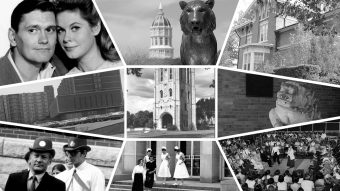May 12, 2021
Contact: Deidra Ashley, ashleyde@missouri.edu
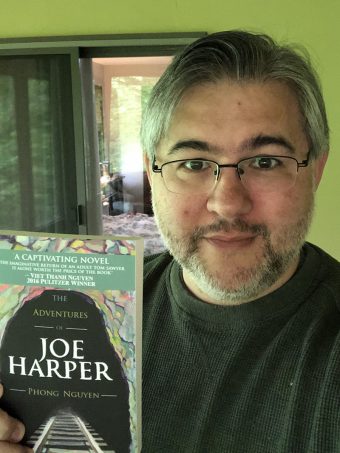
'The Adventures of Joe Harper'
By Phong Nguyen, professor and Miller Family Endowed Chair of Writing; director of the creative writing program
In this continuation of the classic The Adventures of Tom Sawyer, follow Joe Harper and his surrogate family – a philosophizing Chinese railroad worker and an Amish woman fleeing a forced marriage. When the three are arrested and forced to work in a chain gang, their narrow escape earns them a powerful enemy, until they are rescued by Tom Sawyer … who just might be the greatest threat they’ve faced yet.
What inspired you to write this book?
The Adventures of Joe Harper was directly inspired by a quote from Mark Twain's Adventures of Tom Sawyer:
"As the two boys walked sorrowing along, they made a new compact to stand by each other and be brothers and never separate till death relieved them of their troubles. Then they began to lay their plans. Joe was for being a hermit, and living on crusts in a remote cave, and dying, some time, of cold and want and grief; but after listening to Tom, he conceded that there were some conspicuous advantages about a life of crime, and so he consented to be a pirate."
After reading that quote, I had this crystal-clear image of Joe Harper's character as distinct from the characters of Tom Sawyer and Huckleberry Finn. Even though not much is known about Joe Harper from the two books in which he appears (Tom Sawyer and Huckleberry Finn), I felt that I had a good grasp on his quixotic and romantic personality and was compelled to explore it in this novel.
What type of reader would enjoy your book?
Anyone who enjoys the works of Mark Twain, "road novels" or voice-y literary novels will appreciate The Adventures of Joe Harper.
Who is your favorite author?
Mark Twain, obviously!
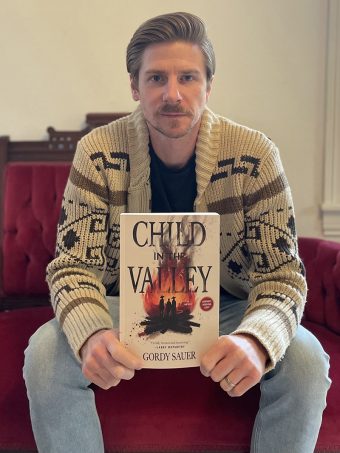
'Child in the Valley'
By Gordy Sauer, executive communications specialist and senior writer for President Mun Choi
Seventeen-year-old Joshua Gaines is the orphaned foster son of a failed doctor, on the run from his father’s debt. In 1849, he travels to Independence, Missouri, and falls in with mysterious four-fingered Renard and his companion, formerly enslaved Free Ray. As they embark on the fifteen-hundred-mile journey to Gold Rush California, the young doctor-turned-marauder must reckon with his own morality, his growing desire for the men around him, and the brutality that has haunted him all his life. This novel is currently available for pre-order and will be released on Aug. 24.
What does this book mean to you?
It’s meant a lot of time, hard work and commitment. It’s also meant some great experiences. As part of my research for the book, I actually traveled the California Trail from Independence, Missouri, to the Marshall Gold Discovery State Historic Park in Coloma, California, in the summer of 2017.
What is something readers should know about Joshua Gaines?
He’s a young man who is orphaned twice in the span of 17 years — twice-orphaned into poverty on top of that — and someone who has this insatiable desire to better his life. In many ways, he represents what I think is a very basic human challenge: We are born into a set of circumstances beyond our control (whether through chance or otherwise), and along the course of our lives, we have to make specific choices at very specific moments. Those choices shape our life’s trajectory, and, once we make that choice, we can’t ever go back to the life we had before that choice. Sometimes that’s a good thing. Sometimes it’s not.

'The Children Are Reading'
By Gabriel Fried, assistant professor of English
If you’re feeling nostalgic, Gabriel Fried’s collection of poetry regarding childhood wonder, innocence and vulnerability is the right choice for you.
What inspires your poetry?
Moments, including verbal moments, that shudder with some confluence of wonderment and vulnerability. It’s why, I suspect, so many of my poems set themselves in the landscape of childhood: It is full of discoveries but also of the hidden, often latent, consequences of discovery.
What does this book mean to you?
It is the book that came out of becoming a parent, which also serves as a perpetual reminder of having been a child. When writing, I think of adults as former children, ones who mythologize their own childhoods in all sorts of ways. That premise is deeply engrained in my writing; everyone’s so-called origin story is a vital part of who they are.
What type of reader would enjoy your book?
I hope lots of different readers! My poems are often just a bit creepier than I mean them to be, so if I had to name a type, I would say readers who like unbowdlerized fairy tales or other literature that makes you feel like a goose is walking over your grave.

'A Girl's Guide to Missiles: Growing Up in America's Secret Desert'
By Karen Piper, professor of English
A memoir that reads like a coming-of-age story straight out of the fiction section, this tale of Karen Piper’s life as a young girl growing up on the China Lake missile range in the Mojave Desert is true — and utterly jaw-dropping.
What does this book mean to you?
I grew up in a cloistered, evangelical, military environment at the China Lake Naval Weapons Center, a base in the California Mojave Desert. My parents both built missiles. After attending a Baptist college, I went to graduate school in the hippie mecca of America: Eugene, Oregon. It was my first time truly away from home and was quite the culture shock; it completely changed me, in a good way. But I always had trouble reconciling those two sides of myself — the Eugene side and the China Lake side. Writing this book helped me to heal that divide and reclaim my past. Now, I tend to embrace those transformative moments where everything you once knew seems wrong; it opens up this amazing space for learning, which can be quite joyous and dizzying. But I also understand the importance of not abandoning who you once were. We are always evolving, after all.
What type of reader would enjoy your book?
It’s really for anyone, but I see the book as being for young women finding their way in “a man’s world.” Or men who have been in the military or are attracted to serving. A lot of the book is about figuring out which wars are “just,” if any, and how to deal with the consequences of wars. But it’s also for anyone who is curious about what it’s like to grow up inside the military-industrial complex, at one of America’s top secret military bases, or anyone who has left a very religious background and is trying to sort out what faith means to them away from home.
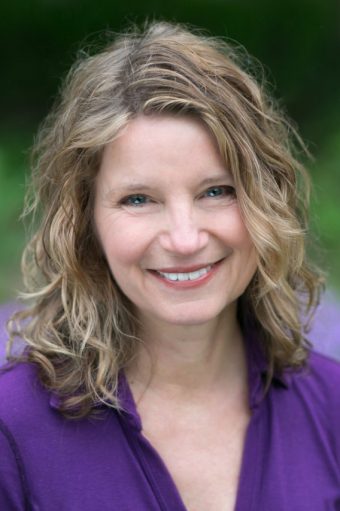
'Masterpiece: America's 50-Year-Old Love Affair with British Television Drama'
By Nancy West, professor of English
If “Sherlock Holmes,” “Downton Abbey” or any other British drama captured your heart and imagination, you’re not alone. Through Masterpiece, Explore the history of America's long-held fascination with British TV through this compilation of interviews, photography, anecdotes and rich history.
What inspired you to write this book?
I have been watching British television drama ever since I was a kid! Shows like “Upstairs, Downstairs,” “The Six Wives of Henry the VIII,” and “The Jewel in the Crown” made me fall in love with England, its history and literature, theater and countryside … And London; I love London!
What is something that readers should keep in mind while reading this piece?
That the shows they know and love, like “Downton Abbey,” “Prime Suspect,” “Sherlock” or “Endeavour,” only came to the U.S. because of “Masterpiece.”
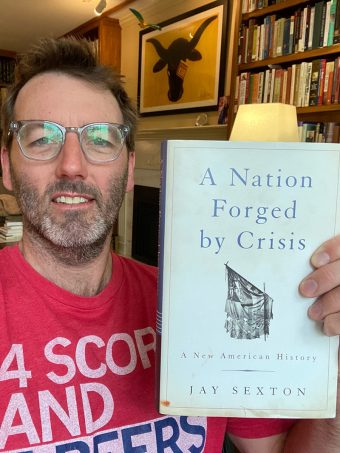
'A Nation Forged by Crisis: A New American History'
By Jay Sexton, professor of history
This examination of American history through a new lens takes our traditional understanding of events and turns them on their head.
What is something that you want readers to take away from reading this?
I hope readers come away understanding that the United States has never been self-contained or isolated; our country’s history has been determined by its ever-changing position in the world. The most neglected actors in American history are those from outside the nation’s borders. The book highlights how the America that we know today is the product of immigrants, geopolitical rivalry and the messy processes of cross-border exchange that we now call globalization. This international take on America’s past is one that transcends the rival (and equally brittle) interpretations of American history that have been produced in recent years by historians immersed in today’s culture wars. So, if you want to think about U.S. history in a cosmopolitan manner that is free from the baggage of our self-perpetuating culture wars this might be the book for you.
What type of reader would enjoy your book?
I hope anyone with an even occasional interest in history would find it worthwhile. Did I mention that the book is only 198 pages?
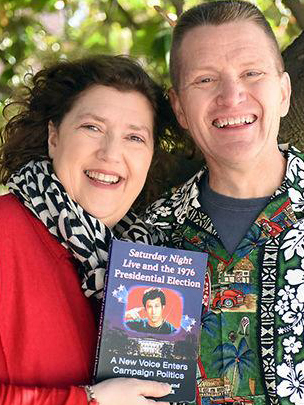
'Saturday Night Live and the 1976 Presidential Election: A New Voice Enters Campaign Politics'
By Bill Horner, political science professor and director of undergraduate studies; and Heather Carver, theatre department chair, co-director of the writing for performance program
Husband-wife duo Bill Horner and Heather Carver explore the cultural and political impact that Saturday Night Live (SNL) has had since its debut and how the show brings together seemingly polar-opposite professions: politics and comedy.
What inspired you to write this book?
We have watched SNL for 40 years and are interested in its cultural influence. Years ago, we saw an internet page about SNL that claimed the show had influenced the outcome of the 1976 presidential election … We wanted to explore that possibility.
What does this book mean to you?
It shows the important ways in which politics and performance merge in a national conversation and the impact of popular culture on public opinion and politics.
Do you have any other books in the works?
Yes, we have a second book on SNL and the Trump era in the works and a new book on AIDS activist Pedro Zamora and his story as told on season three of MTV's The Real World.
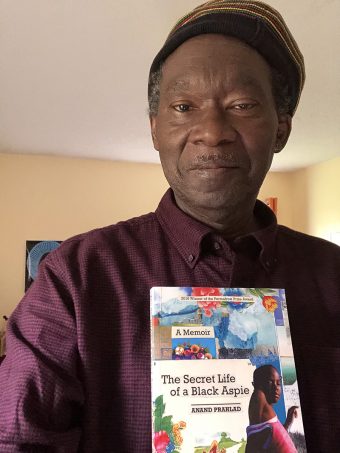
'The Secret Life of a Black Aspie: A Memoir'
By Anand Prahlad, Curators' Distinguished Teaching Professor Emeritus
This memoir dives into the life and experiences of writer and scholar Anand Prahlad. Rooted in Black folklore and cultural ambience, and offering new perspectives on autism and more, The Secret Life of a Black Aspie will deepen your understanding of the marginal spaces of human existence.
What inspired you to write this book?
I was primarily motivated by an inner need to do a number of things. One was to try and capture an autistic, neurodivergent perspective, way of being in and experiencing the world. I needed to do this for myself, and for others who have similar disabilities, or who know someone else who does, or who might just be interested in better understanding. I was also motivated to record some of my memories because I could feel them slipping away (due to my memory deficit disorder).
What does this book mean to you?
It means, among other things, a coming out. By this I mean that it represents my willingness to publicly identify myself as an autistic, gender fluid person. It also represents a willingness to be open about many of the experiences that have shaped who I am, such as traumas, or growing up in the shadow of a slave plantation. It means that I got to write my own story and claim my own reality.

'Siberian Exile: Blood, War, and a Granddaughter's Reckoning'
By Julija Šukys, associate professor of English
Siberian Exile is a deep dive into the story of Julija Šukys’ grandfather Anthony, who rarely smiled, and her grandmother Ona, who spoke only in her native Lithuanian. Piecing the story together from letters, oral histories, audio recordings and KGB documents, Šukys discovered a Holocaust-era family secret.
What does this book mean to you?
The experience of writing the book taught me the meaning of clichés like, “be careful what you wish for.” I’m an archival researcher and much of what I write is rooted in dusty papers of some kind. For this book, I used private family archives, that is, letters that my grandmother sent from her Siberian log house to her children overseas in England and Canada. And then, more than halfway through the writing process, I decided to see if I could get my hands on our family’s KGB files. I launched an archival search and discovered that the KGB had compiled a huge file about my grandfather. It outlined war crimes accusations against him and claimed that he had taken part in the massacre of Jews during the Holocaust in Lithuania.
From this experience, I learned that my knowledge of my family’s past was only partial. I learned that there’s so much more to know, and that, when doing this kind of research, one has to be prepared to find just about anything.
What is something that you want readers to take away from this book?
This book led me to rethink my relationship to the past and to family lore in radical ways. I think the book can act as a kind of cautionary tale. It warns against feeling too certain about who we are, where we come from and how that (largely imaginary) past shapes us.
Story written by Madalyn Murry


